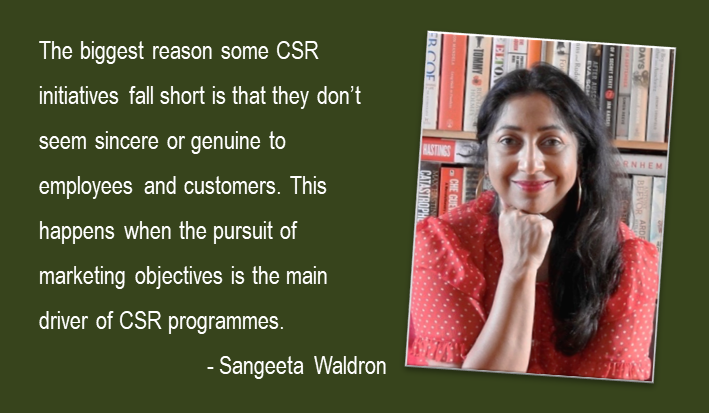It would be fair to say that the world is at a tipping point – climate change, plastic pollution, bush fires, disappearing forests, a global pandemic and explosive conversations about diversity and inclusion. Now, more than ever, it is important for all types of businesses to have authentic Corporate Social Responsibility (CSR) initiatives that are not a publicity spin.
I have worked a long time in public relations and over the years I have seen different brands and businesses pay lip service to CSR; use it for their own ends. I have witnessed companies partner with charities and causes, only to beat the charities for publicity, not actually for the cause or the mission. When Public Relations (PR) is done this way, the brand does not endure. It’s disingenuous.
However, CSR and branding are two things that do work together. When you define your CSR initiatives based on an understanding of your brand positioning, strategy and identity, the PR and marketing work seamlessly and without effort. A good example, is when clothing companies ensure that their business strategy and production involves improving work conditions in developing countries, creates sustainable supply chains and eco-friendly products.
However, many companies are confused about their own brand identity and values. If you don’t know your brand, how can you expect others to know what you do and what you stand for? Many companies recognise the link between successful businesses and strong branding. They know that branding is not just a logo, or how their business is perceived externally, but too few realise that successful brands have their brand CSR values positioned at the core of their business. Ideally, branding is entwined with your CSR values, defining your business for yourself, your team, and your customers and other external audiences. It is the business ‘identity,’ embodying the essence of what it is, not just what it looks and sounds like.
We know that the way that consumers interact with brands today has changed and for companies to really engage and connect with these digitally empowered customers, they need to ensure that their identity, and the behaviours they engage in, have the right impact. It matters to not only delivers exceptional products and services, but also contributes to the community and takes an active role in addressing universal issues.
The biggest reason some CSR initiatives fall short is that they don’t feel sincere or genuine to employees and customers. This happens when the pursuit of marketing objectives is the main driver of CSR programmes. When businesses spend all their time focusing on how their CSR strategy will make their brand look great, they miss out on making moves that will actually impact the community and live up to the things their marketing campaigns are saying.
Many businesses have found that CSR helps them to identify their brand purpose and create a personality that their customers can connect with on a deeper level. Almost half of your company’s reputation comes from the public response to what your business is doing to support the current environment. The most ‘responsible’ brands have customers that are more likely to buy their products, act as brand ambassadors, and leave positive reviews about the company. This is real PR.
Too many businesses and organisations still view sustainability as ‘nice to have,’ rather than integral to the way they do business. This approach is inherently bound to fail, and companies need to adjust to a new reality. A growing number of firms have just done that, and have truly built their brands on their CSR values. Their communications and PR strategies have been able to speak for themselves — the messaging is consistent, effortless and risk to the value of the brand is low. One of my favourite examples is TOMS Shoes, a brand founded on the idea that for every pair of shoes sold, the company will donate a pair to a child in need. Over time, the brand’s mission has expanded to include providing more healthcare, education and economic opportunities to children around the world.
Since it was founded in 2006 in Texas, TOMS has donated more than 60 million pairs of shoes to needy children, restored sight to 400,000 people, provided over 335,000 weeks of safe water to communities, and helped 25,000 mothers safely deliver their babies. Many CSR initiatives ‘think local,’ but TOMS Shoes made it a point to think globally. They integrated giving into the very core of their business model, which has helped to inspire not only their employees but their customers as well.
Publicity is about finding a way to separate your company from the similar businesses out there that offer competing products and services. By engaging in authentic CSR initiatives that are integrated and within the business and communication strategies, you show that you’re not just another copy-paste business producing the same old solutions.
The views and opinions published here belong to the author and do not necessarily reflect the views and opinions of the publisher.



Be the first to comment on "CSR is not PR"